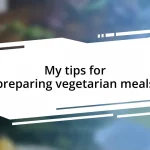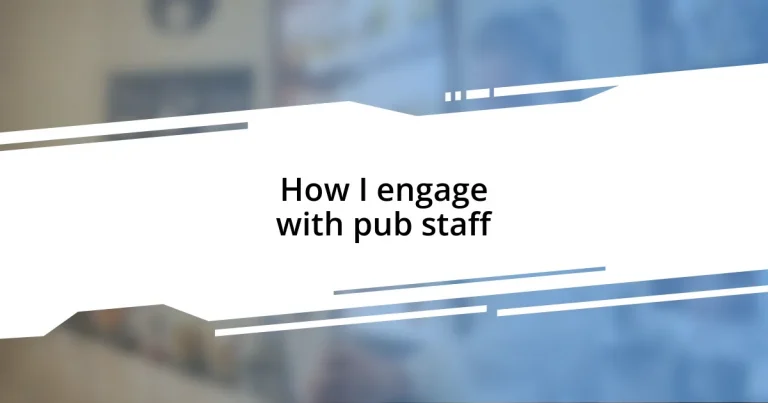Key takeaways:
- Engaging with pub staff through small interactions fosters memorable experiences and builds rapport.
- Asking for recommendations and showing genuine interest in their craft deepens connections and enhances the atmosphere.
- Effective communication, including active listening and positive body language, significantly improves interactions with pub staff.
- Handling difficult situations with empathy can transform potential conflicts into collaborative moments, strengthening relationships.
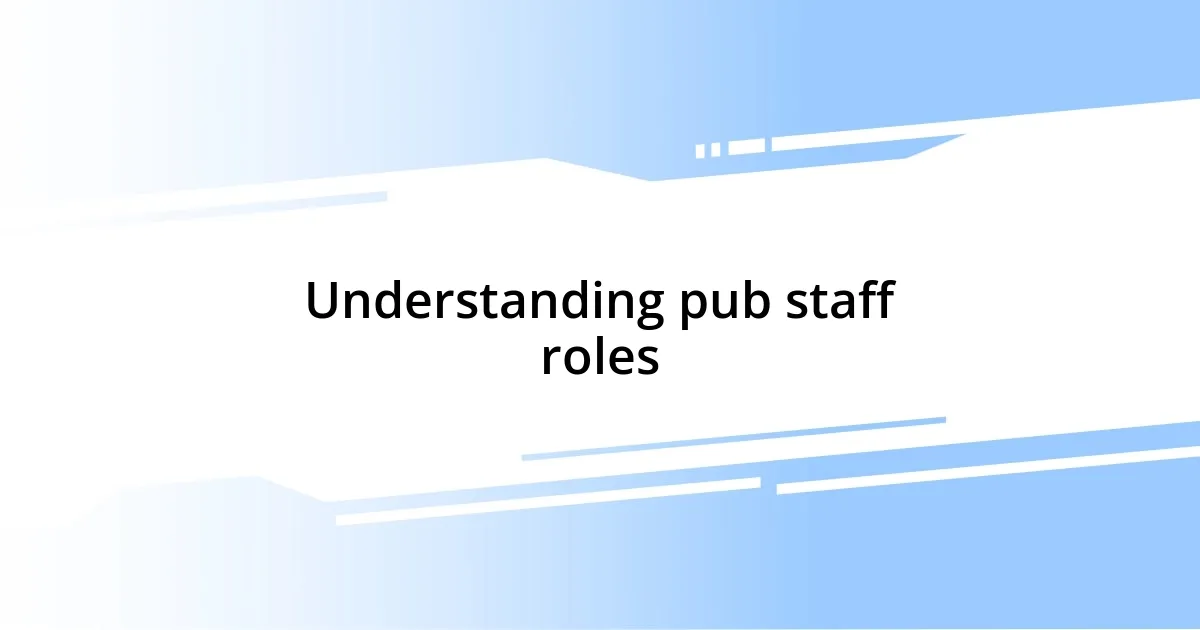
Understanding pub staff roles
Understanding pub staff roles is crucial for ensuring a smooth and enjoyable experience. The bartender typically acts as the heart of the pub, mixing drinks and creating a welcoming atmosphere. I often find myself striking up conversations with bartenders, realizing how their mood can set the tone for the entire night—have you noticed how a simple smile can elevate your experience?
Then there’s the wait staff, who play an essential role in bridging the gap between customers and the kitchen. I remember a night when my server went out of their way to recommend a local craft beer that perfectly complemented my meal. It made me appreciate the knowledge and passion that pub staff bring to their jobs, transforming routine moments into memorable experiences. What do you think happens when a server enjoys their work? It’s infectious, and it definitely enhances the dining experience.
Lastly, we can’t overlook the kitchen staff, often working tirelessly behind the scenes. I’ve seen how a rush of orders can bring them into a full frenzy, yet their dedication to quality never falters. Have you ever thought about how much effort goes into each dish that arrives at your table? Understanding these roles makes me appreciate all the hard work pub staff put in, often without recognition, to make our nights out truly special.
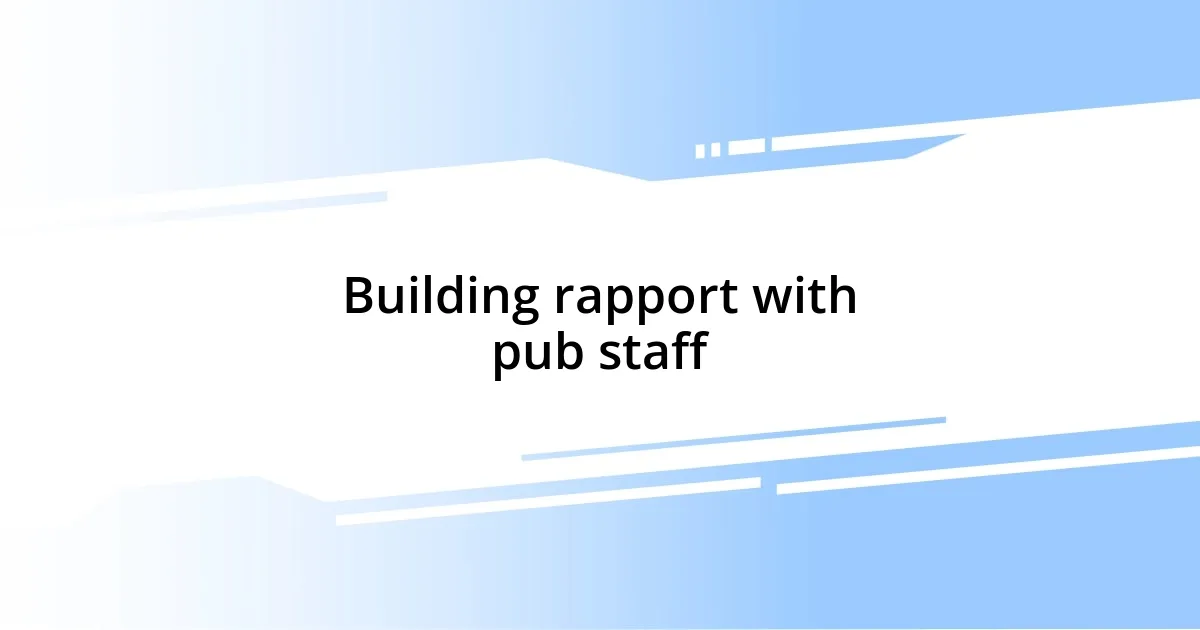
Building rapport with pub staff
Building rapport with pub staff is all about those small interactions that can transform an ordinary visit into something memorable. I’ve often found that learning the names of the bartenders or servers adds a friendly touch to my experience. Recently, I went to my local pub and noticed the bartender’s unique way of crafting cocktails. I made it a point to ask for their favorite concoction, and that simple exchange sparked a lively conversation. By showing genuine interest in their craft, I could see their eyes light up, and it felt rewarding to share that moment.
- A warm smile can break the ice and make staff feel appreciated.
- Asking for recommendations not only shows interest but opens up a dialogue.
- Complimenting their service or suggesting a new drink can create a sense of camaraderie.
- Sharing a laugh can lighten the atmosphere, making everyone feel more at ease.
- Remembering small details, like their favorite sports team, can foster a connection that lasts beyond a single visit.
These moments of connection instantly feel more personal, and I believe they can lead to better service and an all-around enjoyable evening.
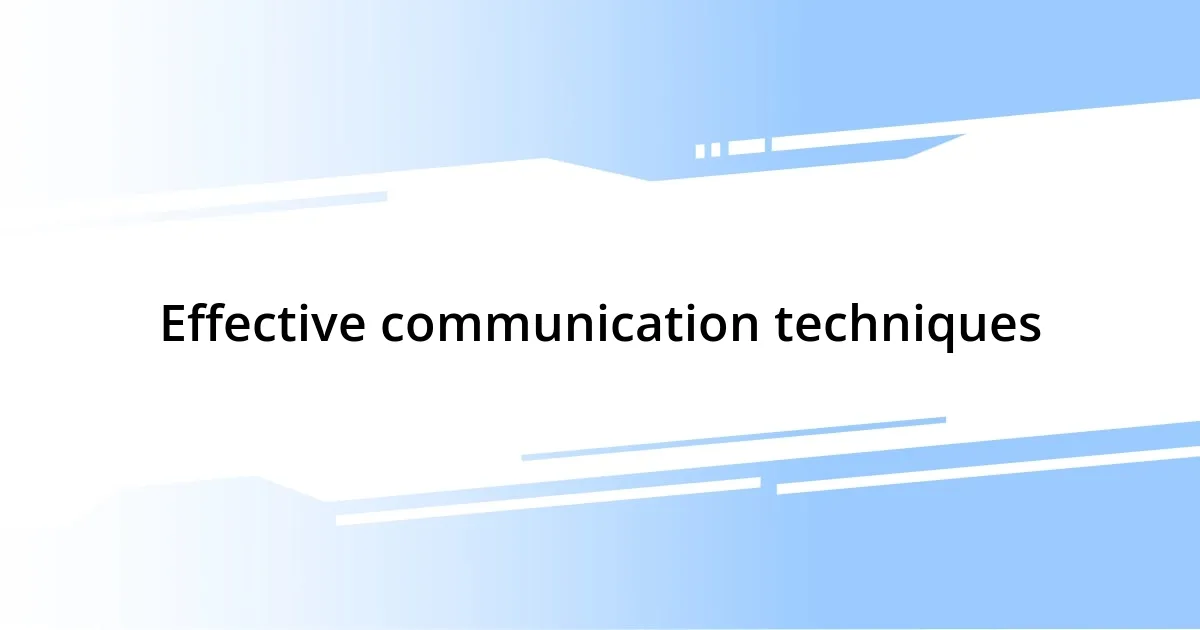
Effective communication techniques
Effective communication with pub staff can significantly enhance your overall experience. For instance, I make it a habit to ask open-ended questions about their day or current specials. This not only shows I’m interested but also often leads to delightful interactions. I remember one time, the bartender shared stories about the local breweries that inspired the drink menu. Hearing those stories made me appreciate the drinks even more. Have you ever realized how much richer your drink feels when you know the backstory behind it?
Active listening plays a crucial role, too. Instead of just nodding along, I try to engage with what they are saying. For example, during one visit, one of the servers shared a funny incident involving a mix-up with an order. I laughed along, and that genuine moment created a connection that made me a regular at that pub. It’s funny how sharing a laugh over a simple mistake can turn a fleeting interaction into a lasting memory.
When it comes to effective communication techniques, body language matters as well. I’ve noticed that when I maintain eye contact and lean in slightly during conversations, it conveys my interest and appreciation. Last week, I sat at the bar and had a spontaneous chat with a barback who was restocking the shelves. I could see their pride when recounting the history of a certain beer brand. I left that night not just with a drink, but with a newfound appreciation for the work they do—even in roles that often go unnoticed.
| Technique | Description |
|---|---|
| Open-Ended Questions | Encourages conversation and deeper connections. |
| Active Listening | Engaging fully with what they say fosters a friendly atmosphere. |
| Positive Body Language | Maintains eye contact and shows genuine interest, making staff feel valued. |
| Sharing Anecdotes | Relating personal stories creates a bond and makes conversations memorable. |
| Appreciation and Compliments | Expressing gratitude enhances rapport and enriches interactions. |

Asking for recommendations
Asking for recommendations is one of my favorite ways to engage with pub staff. I remember a night at a cozy pub when I asked the bartender for their favorite beer. Instead of just listing off options, they passionately described the flavors and the brewing process, making the whole experience feel special. It’s moments like these that not only inform my choices but also deepen my connection with the staff.
When I ask for recommendations, I often phrase my question to invite a conversation. For example, after expressing my interest in a particular spirit, I might say, “What’s your go-to cocktail with that?” I’ve found that this approach often leads to delightful exchanges. I recall a time when a server not only recommended a drink but also shared an amusing story about a quirky customer who had a taste for unusual flavors. Such anecdotes make the entire evening feel more vibrant.
More than just acquiring great drink ideas, asking for recommendations also signals a respect for their expertise. Have you ever noticed how staff perk up when you value their opinion? It creates a rapport that transforms a simple order into a memorable interaction. By being genuinely curious about their favorites, you’re inviting them into your experience, and it’s amazing how this small act can enhance the atmosphere and make you feel like part of a community.
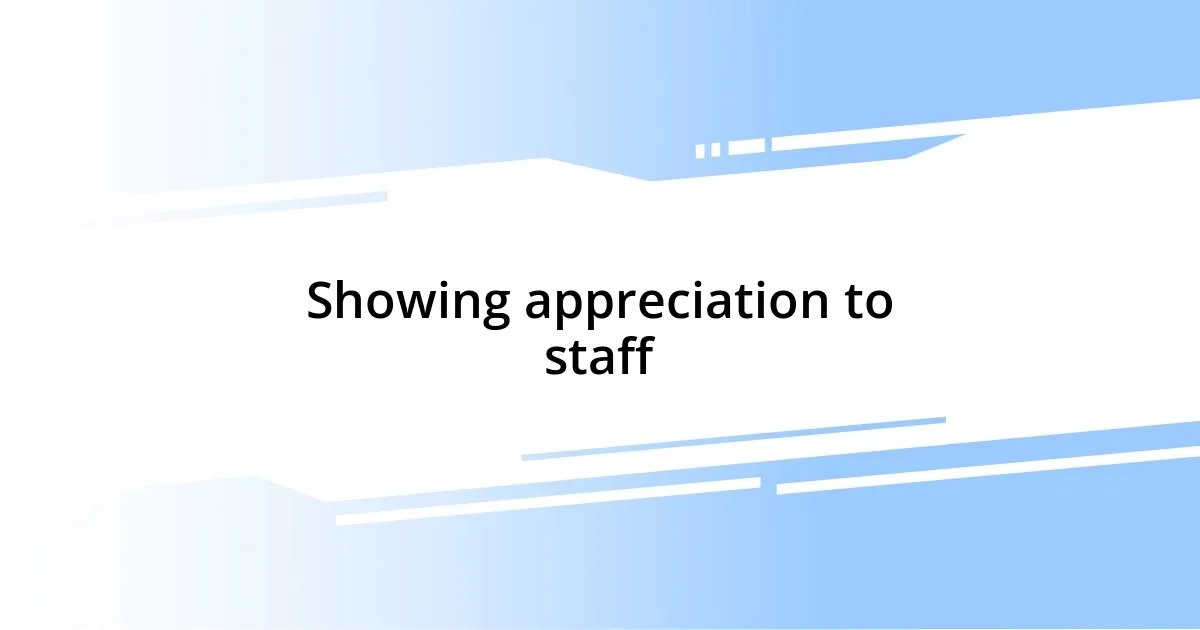
Showing appreciation to staff
Showing appreciation to pub staff can make a world of difference. I always remember to thank them for their service, and I try to be specific about what I enjoyed. For instance, after a delightful meal, I once told a waitress how much I loved the way she paired flavors in the dish. It lit up her face, and that’s the kind of connection that sticks with you.
A compliment goes a long way, especially when it’s genuine. During one of my visits, I noticed the bartender juggling bottles while mixing drinks. I couldn’t help but applaud their skills, which sparked a fun conversation. How often do you see someone put extra flair into their job? That little moment reinforced my appreciation for their craft and created a friendly atmosphere.
Moreover, leaving a positive review after a great experience is my way of showing gratitude. I once wrote about a particularly attentive server who anticipated my needs effortlessly. Not only did it boost their morale, but it also encouraged others to visit that pub. Isn’t it nice to think that a few kind words can create a ripple effect, impacting not just the staff but also the establishment as a whole?
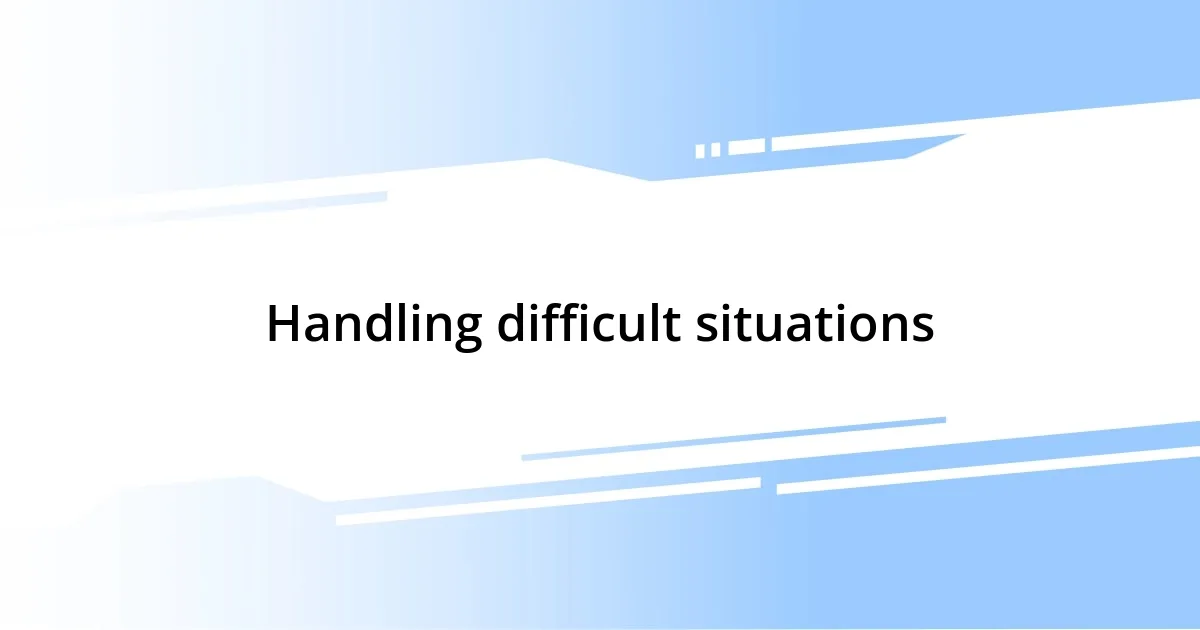
Handling difficult situations
Handling difficult situations in a pub can be a test of patience and understanding. I once faced a scenario where my order was mistaken, and the server seemed overwhelmed. Instead of reacting negatively, I took a moment to breathe, smiled, and said, “I think there’s been a mix-up, but I trust your judgment. Could we work together to sort it out?” That simple approach not only eased the tension but turned a potential conflict into a collaborative moment.
There was another time when a rowdy table next to me disrupted the atmosphere. I felt a bit uneasy, but I knew it was vital to remain calm. I decided to share my concerns with the staff directly. When I approached the bartender, I said, “I love this place, and I feel like tonight’s vibe is a bit off. Is there anything we can do?” Engaging with them about the situation not only made me feel heard but also allowed them to address the issue without feeling defensive.
Reflecting on these moments, I’ve realized that empathy is essential. Have you ever noticed how much easier it is to navigate tough situations when you choose kindness? By understanding that the staff often faces their own pressures, I find that patience and open communication can transform any challenging experience into a meaningful interaction. It’s not just about resolving a problem; it’s about building relationships that can withstand the occasional storm.

Creating lasting connections
Creating lasting connections with pub staff is about more than just being a customer; it’s about building mutual respect. I recall a night when the chef came out to chat with diners. I took a moment to compliment the unique twist on a classic dish, and we quickly fell into a discussion about food inspirations. That brief exchange not only made my evening memorable, but it also turned the chef into a person, not just a name on the menu. Have you ever experienced a moment that transformed a stranger into a friend?
Another time, I found myself sharing stories with a bartender about our favorite local brews. We connected over a mutual love for craft beers, which led to them offering me a taste of something new they were excited about. It wasn’t just an exchange of drinks; it was a shared passion. Those conversations helped me feel like a regular, even after just a few visits. Isn’t it enriching when our interests intersect with those we encounter in our daily lives?
I’ve learned that small gestures, like remembering a staff member’s name or their favorite drink, can create powerful bonds. I once visited a pub regularly and made it a point to learn the names of the staff members. When I walked in and greeted them by name, you could see their smiles light up. Those connections made my visits feel special and homey. Don’t you think recognizing someone in a busy setting can really make all the difference?




